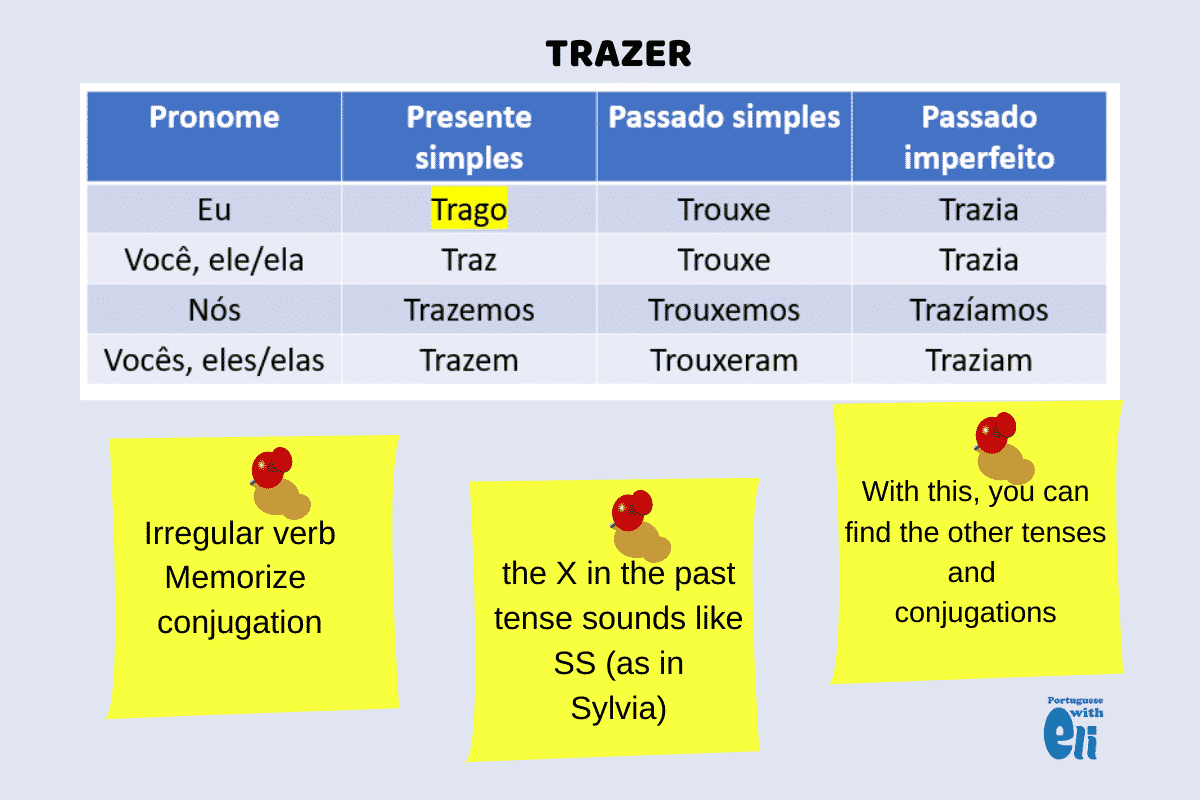Look no Further: Here’s the Difference between Levar and Trazer in Portuguese
The difference between trazer and levar in Portuguese is not always clear.
In English, you guys also have two words — bring and take — but you don’t use them quite like we do it in Portuguese.
And if your native language is, say, Mandarin Chinese, the situation gets worse. You usually have to resort to two verbs to express the idea contained in our trazer and levar.
But that’s not to worry about. Now, your super teacher (me!) is going to open your mind and put inside it the little seed of comprehension.
Levar — It’s Just a Matter of Perspective
And I mean it.
Levar means “take something along with you from where you are now.” That’s a funny definition but it’s what it is.
The most common situation I can imagine this verb being used is when parents have to take their children to school.
You’re at home with your children. Then you say to yourself: Tenho que levar meus filhos para a escola. Está ficando tarde. (I have to take the children to school, it’s getting late.)
(By the way, you can also say that of dogs — levar o cachorro para passear. No offense to children. It’s just a quite versatile verb.)
Let’s take a look at some examples to clarify this whole thing:
- Eu vou viajar para o Brasil e vou levar meus dois filhos. Agora estou em El Paso, no Texas. I’m going to travel to Brazil and I’m going to take my two children along with me. Now I am in El Paso, Texas.
- Ela vai levar dinheiro para o show, porque quer comprar comida lá. Não estamos no show ainda. She’s going to take money along with her to the concert because she wants to buy food there. We aren’t in the concert yet.
- O que vamos levar para a festa de aniversário do Jean? What are we going to take to Jean’s birthday party?
As you can see, I’ve added some context to each example.
Take a careful look at each one of them.
In example number one, this person is in El Paso, Texas. And they utter the sentence while in El Paso.
In the second example, “she” isn’t in the concert yet.
And in the third example, Jean’s birthday party’s probably going to take place somewhere else other than the place they’re now.
Again, it’s just a matter of perspective.
But trazer may give you some headache… If you don’t take a look at the picture below.
Trazer — This Commands a Little More Attention
Trazer means “to bring something from where you are when you say it.”
There are some more grammar-sy definitions but we don’t need them.
And here are some exhibits for you to enjoy and understand:
- Você vai trazer seus filhos para cá? Que ótimo, ficamos felizes em receber todos vocês. Are you going to bring your children here? That’s great, we’re happy to welcome you.
- Oi, mãe! Estou aqui no teatro. Você pode vir aqui e trazer minha carteira? Estou sem dinheiro. Hey, mom! I’m here in the theater. Can you come over here and bring me my wallet? I have no money.
- Ah, pode trazer qualquer coisa. É meu aniversário, mas meu presente mesmo é sua presença. Ah, you can bring anything. It’s my birthday but my gift is really your presence.
The more astute learner — and by that, I mean you — will notice that these examples are the responses to the previous ones.
Just read them together and you’ll grasp the whole thing.
Important Things to Consider about Trazer
The conjugation of the verb trazer in Portuguese is completely irregular.
And yep, I mean you have to memorize it. But I made it easy for you. All you need to do now is take a look at the table below.
Was That Hard?
Well, I guess it wasn’t. I can’t hear any complaints from here. But I know you may have any questions. If that’s the case, just go here and ask your question 🙂
Here is a song by Chico Buarque for you to remember the Traga-me um violão chorus forever 🙂
And if you want to see more differences of verbs in Portuguese, go to our vocabulary section right now and feast on the content-rich pages I prepared just for you.






